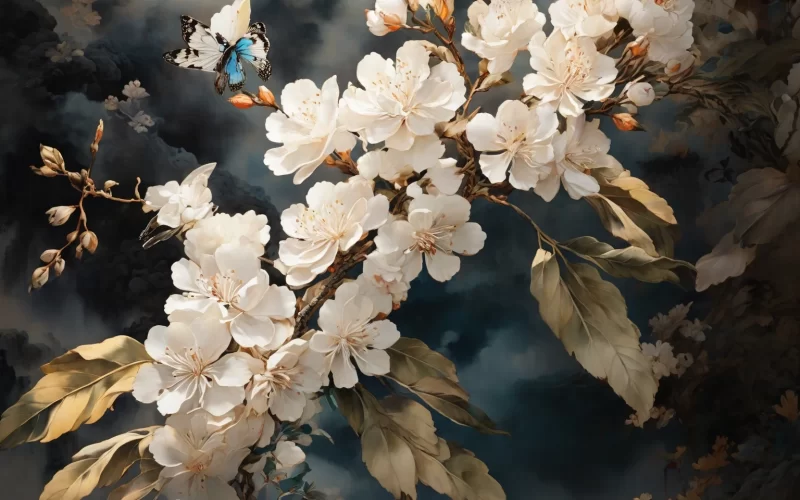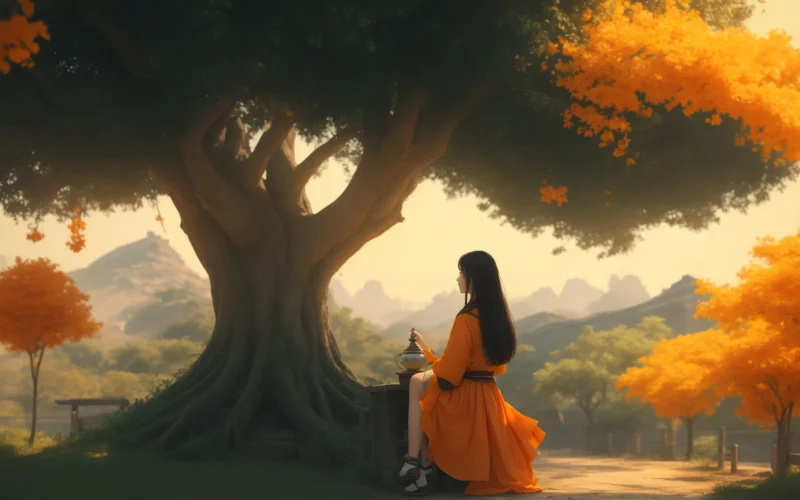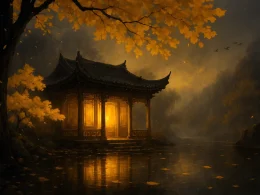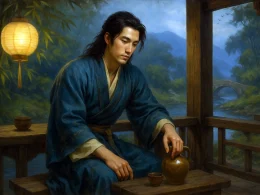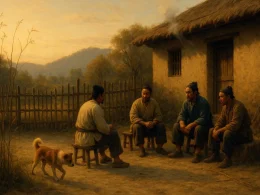Tender orchid-leaves in spring And cinnamon- blossoms bright in autumn Are as self- contained as life is, Which conforms them to the seasons. Yet why will you think that a forest-hermit, Allured by sweet winds and contented with beauty, Would no more ask to-be transplanted THan Would any other natural flower?
Original Poem
「感遇 · 其一」
张九龄
兰叶春葳蕤,桂花秋皎洁。
欣欣此生意,自尔为佳节。
谁知林栖者,闻风坐相悦。
草木有本心,何求美人折。
Interpretation
Composed during the late Kaiyuan era of Emperor Xuanzong's reign, when court politics grew increasingly corrupt, this poem was written after Zhang Jiuling's demotion to Military Governor of Jingzhou due to Li Linfu's slander against his honest counsel. As the opening piece of his Twelve Reflections cycle, it employs botanical metaphors to express the poet's unyielding integrity and lament for unrecognized talent amidst political disillusionment.
First Couplet: « 兰叶春葳蕤,桂花秋皎洁。 »
Lán yè chūn wēiruí, guìhuā qiū jiǎojié.
Orchid leaves flourish in spring's embrace; Osmanthus blooms gleam through autumn's grace.
The poet introduces two noble plants—the orchid and osmanthus—as emblems of virtuous constancy. Their seasonal splendor symbolizes the unwavering moral character of a noble scholar, beautiful in all circumstances.
Second Couplet: « 欣欣此生意,自尔为佳节。 »
Xīnxīn cǐ shēngyì, zì ěr wéi jiājié.
Their vibrant life-force, freely expressed, Makes spring and autumn seasons blessed.
Here, nature's effortless flourishing becomes a metaphor for talent awaiting its proper era. The phrase "seasons blessed" carries dual meaning—both literal seasons and metaphorical "auspicious times" when worthy individuals might serve their country.
Third Couplet: « 谁知林栖者,闻风坐相悦。 »
Shéi zhī lín qī zhě, wén fēng zuò xiāng yuè.
Who would have thought mountain recluses, Catching their fragrance, find joy in solitude?
An allusion to hermits who appreciate virtue from afar. "Catching their fragrance" suggests moral influence that transcends active pursuit of fame—true integrity inspires even without seeking recognition.
Fourth Couplet: « 草木有本心,何求美人折。 »
Cǎomù yǒu běnxīn, hé qiú měirén zhé.
Flora keeps its innate noble line— Why crave a fair hand's plucking sign?
The concluding declaration: like these plants, the noble-minded preserve their essential nature without courting external validation. The rhetorical question underscores Zhang's commitment to principle over political favor.
Holistic Appreciation
Through the orchid and osmanthus, Zhang Jiuling constructs an allegory of the virtuous scholar's dilemma. The first couplet establishes botanical emblems of integrity; the second hints at the Confucian ideal of talent meeting its proper era; the third reveals virtue's quiet influence; while the fourth crystallizes the poet's resolve to maintain purity despite political exile. Blending Qu Yuan's symbolic imagery with Confucian ethos, the poem transforms personal grievance into timeless meditation on moral constancy.
Artistic Merits
This poem masterfully employs metaphorical imagery throughout, blending natural scenery with human emotion to convey profound symbolic meaning and philosophical depth. The poet skillfully uses the "xing" technique (比兴), with spring orchids and autumn osmanthus symbolizing a noble scholar's virtues, personifying plants to express lofty ideals of maintaining moral integrity without seeking worldly fame.
The refined language and meticulous structure create an ethereal, graceful atmosphere, revealing the author's exceptional literary cultivation and personal charisma. Classical allusions are seamlessly incorporated, while the restrained yet powerful emotional expression endows the poem with both aesthetic beauty and philosophical contemplation.
Insights
Zhang's botanical parable reminds us that true worth derives from intrinsic quality rather than external validation. Like the osmanthus that "gleams through autumn's grace," moral character persists regardless of season—a lesson for all who navigate political or professional environments where principle conflicts with expediency. The poem's enduring power lies in its quiet defiance: the unplucked flower's fragrance, like the unappreciated official's integrity, remains potent precisely because it exists for its own sake.
Poem translator
Kiang Kanghu
About the poet
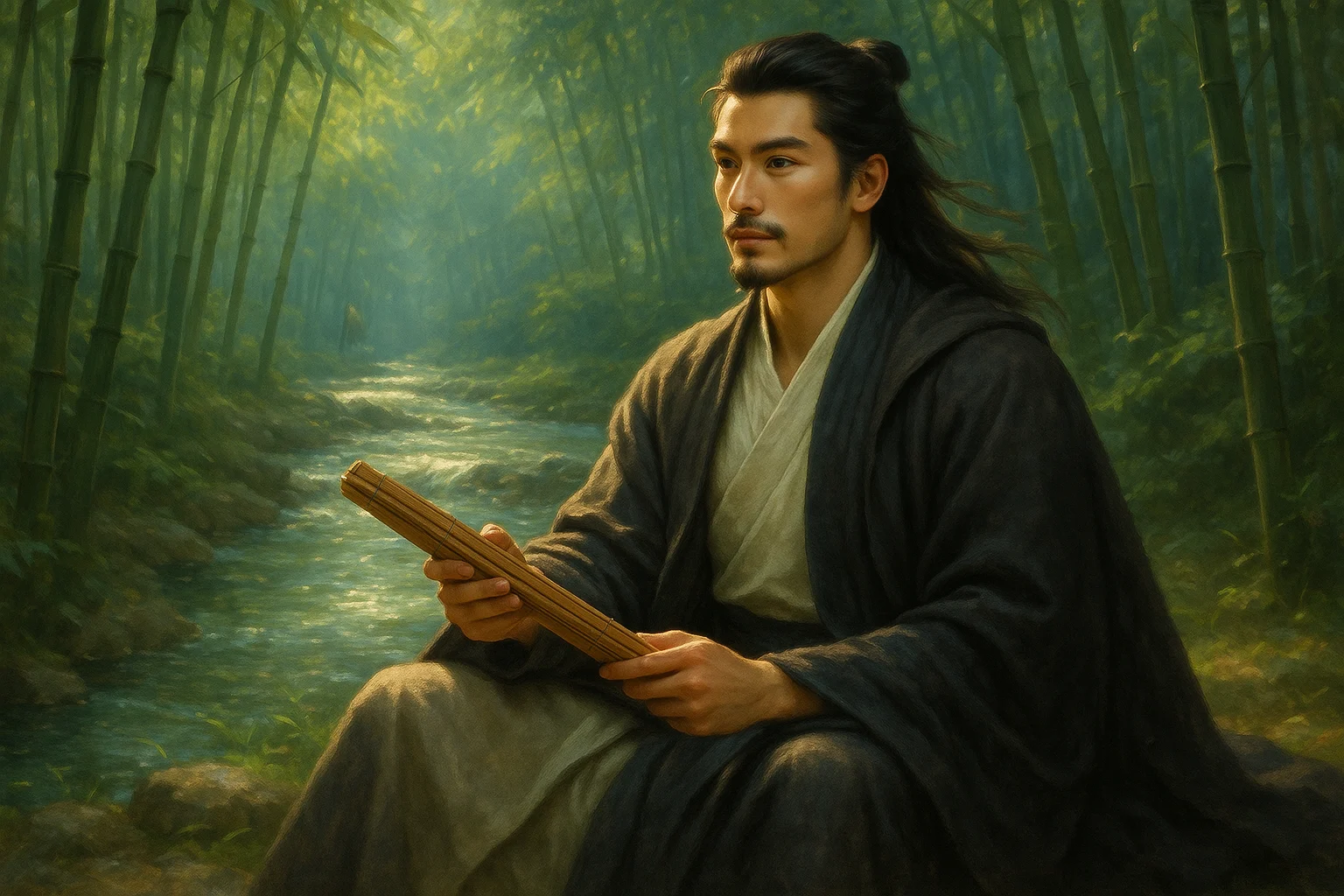
Zhang Jiuling (张九龄), 678 - 740 AD, was a native of Shaoguan, Guangdong. He was the last prime minister of the "Rule of Kaiyuan", and was upright and upright. In 736 A.D., he was ostracized from the court and relegated to the post of Assassin of Jingzhou. He amused himself with literature and history, and wrote a lot of poems that were light, melancholy, and far-reaching.






